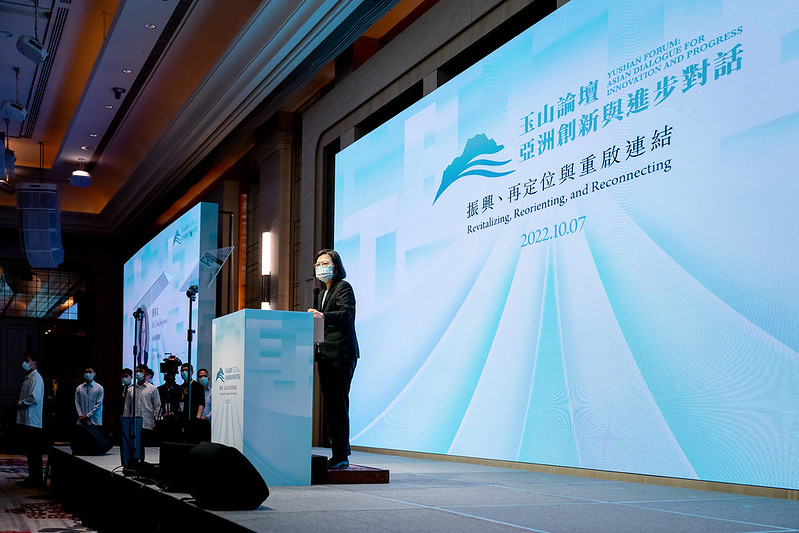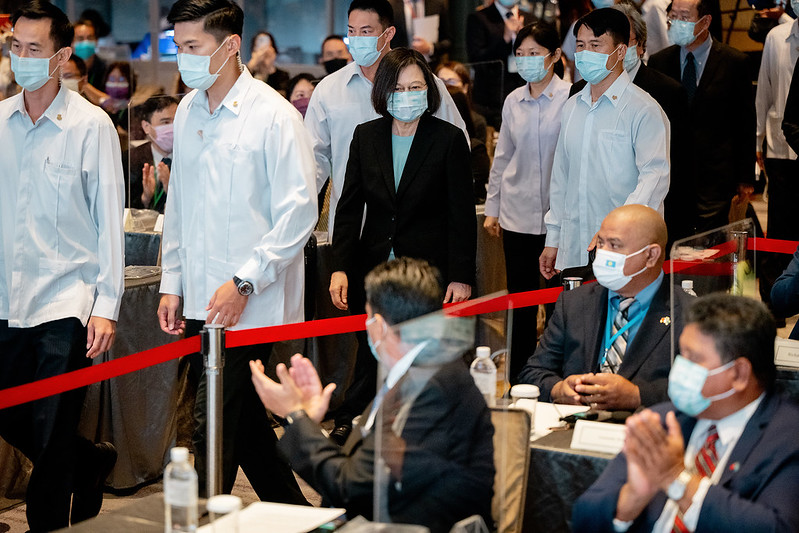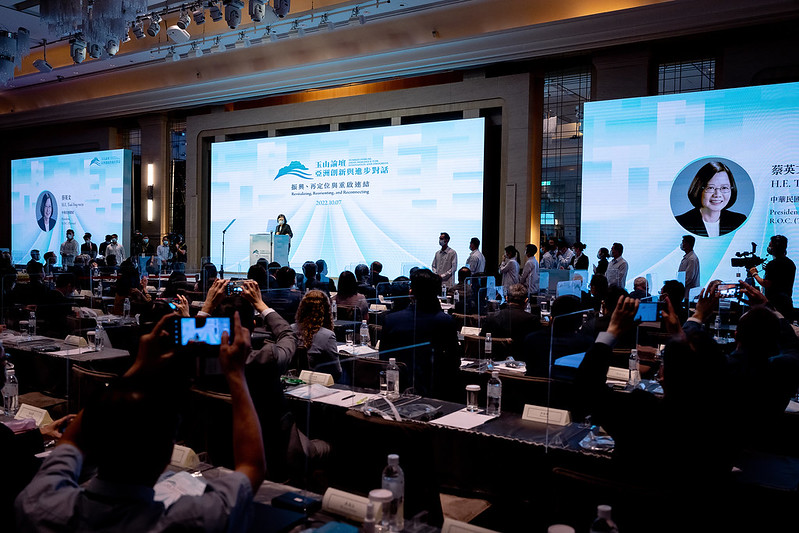News & activities
 News releases
News releases
On the morning of October 7, President Tsai Ing-wen addressed the opening of the 2022 Yushan Forum. President Tsai said that through the New Southbound Policy, which is at the center of Taiwan's Indo-Pacific strategy, we are working to bolster our security and economic ties with partners across the region. She added that as we enter the post-pandemic era, the New Southbound Policy will also be Taiwan's pivotal regional policy for Asia. The president stated that Taiwan will continue to strengthen its links with regional strategic partners, so that we can make real progress in advancing regional security and prosperity.
A transcript of President Tsai's remarks follows:
I want to start by welcoming President Whipps of Palau to Taiwan and to thank him for attending this year's Yushan Forum. It is wonderful to see you again.
Palau's efforts in defending democracy and staunch support for Taiwan are greatly appreciated by our people. We also admire your courage in resisting authoritarian coercion, while safeguarding the values we share.
I would also like to extend a very warm welcome to you all for joining us today, virtually and physically. Your presence here today signifies the strong support you have for Taiwan.
Even though efforts are still being made to contain the spread of COVID-19, the world is working to move beyond the pandemic. As we forge ahead, there are important issues for the region and the world, which we need to pay attention to and combine our efforts to resolve.
With the world starting to see the encouraging sign of the end of the COVID-19 pandemic, the theme of this year's Yushan Forum, "Revitalizing, Reorienting and Reconnecting" is set to facilitate discussions, as we move toward a post-pandemic future with my administration's New Southbound Policy.
The New Southbound Policy was launched in 2016 with the aim to facilitate regional prosperity through trade and investment partnerships, technological and medical cooperation, and educational and people-to-people exchanges, with countries in South and Southeast Asia, as well as Australia and New Zealand.
And through advancing the cross-sectoral synergy that is public-private-people partnerships, or P-P-P-P, Taiwan's New Southbound Policy has seen fruitful accomplishments over the past six years, which have received recognition from partners and like-minded countries.
For example, Taiwanese enterprises have increased their investment in Southeast Asia at a tremendous rate. In terms of bilateral trade, Taiwan and New Southbound Policy countries achieved a new high of US$149 billion last year.
From January to July this year, investments from Taiwan in the 18 Southbound Policy countries surpassed US$2.2 billion. This constituted 43.9 percent of Taiwan's total investment abroad.
In addition, during the first quarter of this year, profits from investments in New Southbound Policy countries by listed Taiwanese companies surpassed their profits from investments in China for the first time.
This was the result of Taiwan's advancement in information and communications technology, precision machinery, and smart manufacturing. And through cloud supply chain management and AI and big data, Taiwanese companies were able to develop more flexible smart supply chains that fit the needs of our New Southbound Policy partners, as well as open more markets in Southeast Asia.
This is an indication that Taiwanese companies' redirection of their investments to New Southbound Policy countries is now a consistent trend. Furthermore, Taiwan has a world-renowned skilled technological workforce and high-tech production capacity.
According to the 2022 World Competitiveness Yearbook published by the International Institute for Management Development in Lausanne, Switzerland, Taiwan is the seventh-most competitive country in the world. And, in terms of research, development, and human resources, Taiwan now ranks number one.
My administration will seize the opportunity to contribute in the global effort to restructure supply chains. We will actively integrate Taiwan's capacity in digital technology innovation with the New Southbound Policy to promote a digital New Southbound initiative.
This effort will strengthen Taiwan's ability to assist in regional and global economic recovery and development. Our high-tech industries, and especially our production of advanced semiconductors, will also help to fuel the regional and global economy.
At this critical juncture, as the world fights to regain its footing from the effects of the pandemic, Taiwan can be a crucial actor in the development and prosperity of our region.
Not only that, Taiwan is also actively addressing issues related to climate change and environmental protection.
Taiwan has long shared climate monitoring technology and natural resource preservation knowledge with our diplomatic allies and Pacific Island countries. Taiwan also partnered with them to promote development assistance programs in climate disaster prevention and mitigation.
At the Our Ocean Conference (OOC) in Palau this April, Taiwan showcased its efforts on how it is managing cleaning up ocean waste, promoting a sustainable blue economy, and executing a series of policies under our Salute to the Seas policy initiative.
We appreciate the positive response we received from the host country Palau and other participating countries. I would like to take this opportunity to congratulate President Whipps again for successfully hosting this year's OOC.
The Indo-Pacific region is now the world's fastest-growing and most influential region. This is also the region that will shape the course of the 21st century and our future.
But in recent years the Indo-Pacific has also come to face serious challenges. Our region's security and economic order are threatened by the expansionist ambitions of authoritarian regimes and their coercive tactics. The democratic values and rules-based order we in the region have long worked to uphold are now being eroded by these actions.
To ensure the peace, stability, and prosperity of the Indo-Pacific, we need a new regional framework that advances collaboration between like-minded democratic partners. Over the past few years, various international efforts have been made toward this goal.
The QUAD, AUKUS, and the Indo-Pacific Economic Framework are all examples of countries coming together to contribute to regional security and development. Continuing and expanding this trend of international collaboration will be key to creating a new vision for the Indo-Pacific that benefits people across the region.
While Taiwan stands on the frontline of authoritarian expansion, our resilient economy and industrial supply chains remain a vital part of the regional ecosystem. It goes without saying that Taiwan will be an indispensable partner in the creation of a new regional framework.
The New Southbound Policy is at the center of Taiwan's own Indo-Pacific strategy. Through this policy, we are working to bolster our security and economic ties with partners across the region. And we sincerely hope that by engaging with friends and partners from around the world here at the Yushan Forum, together, we can make real progress in advancing regional security and prosperity.
The past two years have not been easy for all of us, but we've come a long way. I believe we now have an even greater understanding that our lives and futures are all connected. And, a peaceful and secured world does not come easy. It requires us all to help each other to move forward.
And as we forge toward the post-pandemic era, the New Southbound Policy will be Taiwan's pivotal regional policy for Asia.
While Taiwan seeks to strengthen links with regional strategic partners, we are also grateful to like-minded countries for stressing the importance of peace and stability in the region and across the Taiwan Strait.
This is a true demonstration of warmth, friendship, and partnership.
Time and again, we are confronted by great challenges. But we have always been able to triumph by standing up for one another and working together.
Lastly, I want to wish you all a successful forum and productive conversations.
Thank you all very much.
Also present at the forum were Palau President Surangel S. Whipps Jr., former New Zealand Deputy Prime Minister and Minister of Foreign Affairs Winston Peters, former Deputy Prime Minister of Thailand Phongthep Thepkanjana, Japanese House of Representatives Member and Japan-ROC Diet Members' Consultative Council Chairman Furuya Keiji, and members of the foreign diplomatic corps in Taiwan. Former Prime Minister Aso Taro of Japan also delivered remarks via pre-recorded video.











